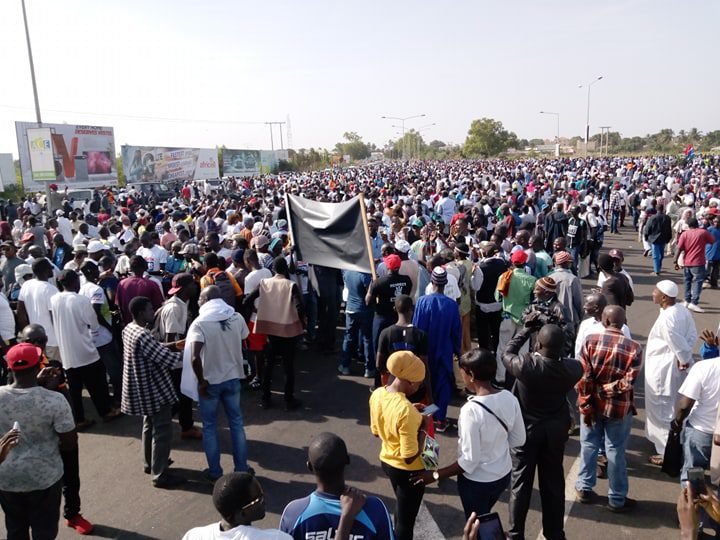Social commentators and analysts have been left picking up the pieces from Monday’s demonstration against sitting Gambian president Adama Barrow, the biggest since the country’s return to democracy three years ago.
The demonstration which was largely peaceful culminated in the handing over of a petition by its organisers under the Three Years Jotna (Three Years are Up) movement, giving President Barrow a month’s ultimatum to make up his mind about relinquishing power as he had promised during the campaign for his election in 2016.
In the immediate aftermath of the demonstration, journalist and social commentator Baboucar Ceesay told the African Press Agency that there may be three to four things gleaned from the mass action.
He said the first could be that the movement had managed to pull a larger than expected crowd of about 30, 000 protesters and perhaps even more.
In the lead-up to the protest, detractors of the movement had dismissed their activism as nothing more than a “misguided and wayward” cause incapable of resonating with the groundswell of public opinion in The Gambia.
“However, as far as I can remember such a crowd has never gathered to demonstrate in this country…I was there as early as 8am and witnessed how the crowd got bigger and bigger as the appointed time for the protest drew nearer” he said.
For a very long time under erstwhile president Yahya Jammeh, Gambians rarely protested because they knew when they did heavy-handedness would be used to crush the faintest hint of defiance against the central authority.
Ceesay who owns and runs the Monitor newspaper said another takeaway from the protest is the reassuring fact that the country has definitely turned a corner as far as civil rights activism is concerned.
What this showed is the inclination of the state even if grudgingly toward tolerating dissent being uncorked on Gambian streets with the unintended consequence of disrupting the rythme of life for a few daylight hours at least.
“This is the price the state has to pay to regain our lost glory in democracy” the local newspaper baron postulated.
He said when Gambians turned their backs on the mercurial Jammeh and handed their ballot to Adama Barrow, they were asking an important sacrifice from him and from themselves in equal measure.
According to Ceesay, in keeping with their promise of a peaceful protest, the demonstrators in their tens of thousands appeared well marshalled by the leaders of the movement who managed to keep frayed nerves under control when it was clear that the target of their action would not show up to receive their ultimatum in the shape of a letter.
Barrow who was shut in at State House in Banjul had sent government spokesman Ebrima Sankareh who was initially turned away by the protesters some of whom felt he was “too junior” to receive the missive on the president’s behalf.
Many among the crowd saw this as a show of petulance on the part of Barrow who notwithstanding restricting their protest to the marsh-fringed highway to Banjul, saw their action as not worthy of his presence.
However, the leaders of the Three Years Jotna movement had managed to talk to their crowds to exercise restraint and refrain from breaking through the barriers leading to the bridge.
Although a few of them had managed to breach the barriers set up by the police, the swelling tide of protesters stayed largely “onside” during the negotiations, which ended with Sankareh being invited to eventually pick up the letter for his boss at No 1 Marina Parade.
Another takeaway for Mr Ceesay is the unsettling knowledge that the protest is far from over given that the movement in their letter to President Barrow stated categorically that they will embark on future demonstrations inside Banjul if the Gambian leader reneges on his electoral promise of stepping down by January 2020, marking exactly three years since he took over the presidency.
The letter also stated that they will not apply for a police permit for the next round of protests as they vowed to occupy the streets of the capital as long Barrow will remain at State House after January 19.
In the run up to the December 2016 election which saw him oust Jammeh from power after 22 years, President Barrow at the head of a coalition of opposition parties promised to lead a three-year transition government after which he would step down and organise fresh elections in which he would not be a contender.
This was one of the conditions of an MoU agreed amongst the parties and an independent candidate which made up the alliance.
However, three years down the line, while Gambians generally see him as reneging on this electoral promise, many believe it is still excusable given that the country’s constitution mandates that an elected president may serve for five years if he so chooses.
But Jeggan Grey-Johnson, a concerned Gambian told APA, the genie in the bottle has already been uncorked.
“What Barrow decides will determine whether we sink or swim as a country, but his choices are extremely limited and he is living on borrowed times” he added ominously.
January will be the moment of truth not only for Barrow but also for Gambia’s newfound democratic spirit.
WN/as/APA


